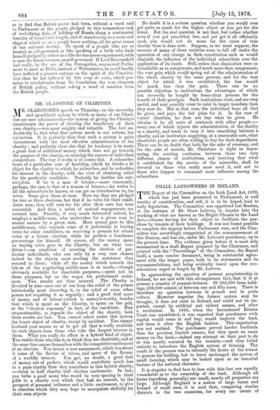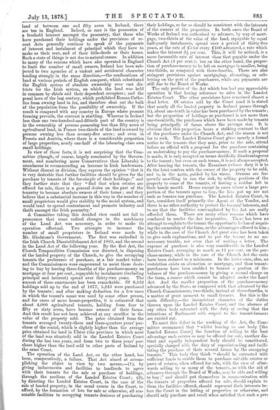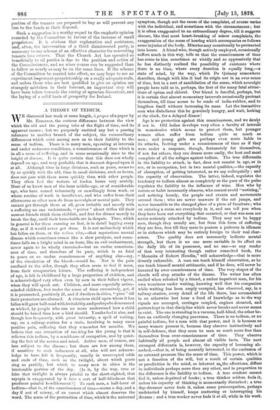SMATI, LANDOWNERS IN IRELAND. T HE Report of the Committee on
the Irish Land Act, 1870, which has just been presented to Parliament, is well worthy of consideration, and will, it is to be hoped, lead to early legislation. The Committee was appointed last Session, at the instance of Mr. Shaw Lefevre, to inquire into the working of what are known as the Bright Clauses in the Land Act,—clauses having for their object to facilitate the pur- chase by tenants of their holdings. It was not found possible to complete the inquiry before Parliament rose, and the Com- mittee was accordingly reappointed at the commencement of this Session, and has sat, under Mr. Lefevre's presidency, up to the present time. The evidence given before it is most ably summarised in a draft Report prepared by the Chairman, and printed with the "Proceedings " of the Committee, the Report itself, a more concise document, being in substantial agree- ment with the longer paper, both in its statements and its recommendations, and being evidently based upon the con- siderations urged at length by Mr. Lefevre.
In approaching the question of peasant proprietorship in Ireland, we are met with this all-important fact, that it is at present a country of peasant-farmers. Of 592,590 farm hold- ings, 498,000 consist of between one and fifty acres. There is therefore no question between /a grande and la petite culture. However superior the former system may be thought, it does not exist in Ireland, and could not be im- ported, except by artificial and violent means, and after a revolution. In 1849, when the Incumbered Estates Court was established, it was expected that purchasers with capital would come in and buy, would improve the land, and farm it after the English fashion. This expectation was not realised. The purchasers proved harder landlords than the previous limited owners, but they spent no more money on the land,—indeed any attempt on their part to do so was mostly resented by the tenants,—and they failed entirely to introduce the English system of farming. The result of the process was to intensify the desire of the tenant to possess his holding, but to leave unchanged the system of small farming, which may be looked upon as an essential feature of the national character.
It is singular to find face to face with this fact one equally remarkable as to the ownership of the land. Although all farms (speaking generally) are small, nearly all properties are large. Although England is a nation of large farms and Ireland of small ones, it is said that, comparing similar districts in the two countries, for every one owner of
land of between one and fifty acres in Ireland, there are ten in England. Indeed, so rare is the possession of a freehold interest amongst the peasantry, that those who have purchased their holdings under the provisions of re- cent Acts generally continue to speak of the payments of interest and instalment of principal which they have to make as their rent, and of their title-deeds as their leases. Such a state of things is not due to natural causes. In addition to many of the reasons which have also operated in England to limit the number of small owners, Ireland has been sub- jected to two agencies of a violent and accidental character tending strongly in the same direction,—the confiscations of land at various periods of English conquest, which substituted the English system of absolute ownership over vast dis- tricts for the Irish system, on which the land was held in common by chiefs and their dependent occupiers ; and the penal laws of the lad century, which prohibited Roman Catho- lics from owning land in fee, and therefore shut out the bulk of the population from the possibility of ownership. If the result is compared with any country in Europe where peasant farming prevails, the contrast is startling. Whereas in Ireland less than one two-hundred-and-fiftieth part of the country is in the ownership of persons possessing less than fifty acres of agricultural land, in France two-thirds of the land is owned by persons owning less than seventy-five acres ; and even in Prussia and Austria, where there is a considerable proportion of large properties, nearly one-half of the labouring class own small holdings.
In view of these facts, it is not surprising that the Com- mittee (though, of course, largely nominated by the Govern- ment, and numbering more Conservatives than Liberals) is unanimous in recommending an increase in Irish landowners. Without dissent or division, they express the opinion "that it is very desirable that further facilities should be given for the purchase by tenants of the fee-simple of their holdings ;" and they further state that they "find that when estates are offered for sale, there is a general desire on the part of the tenantry to become absolute owners of their farms ; and they believe that a substantial increase in this way in the number of small proprietors would give stability to the social system, and would tend to spread contentment and promote industry and thrift amongst the Irish peasantry."
A Committee taking this decided view could not fail to pronounce that some radical changes in the machinery of the Land Act was necessary, in order to make its operation effectual. Two attempts to increase the number of small proprietors in Ireland were made by Mr. Gladstone's Government. The first was embodied in the Irish Church Disestablishment Act of 1869, and the second in the Land Act of the following year. By the first Act, the Church Temporalities Commission was directed, in disposing of the landed property of the Church, to give the occupying tenants the preference of purchase, at a fair market value ; and the Commissioners were empowered to assist those desir- ing to buy by leaving three-fourths of the purchase-money on mortgage at four per cent., repayable by instalments (including principal and interest) spread over thirty-two years. The success of these enactments has been remarkable. Of 8,432 holdings sold up to the end of 1877-, 5,243 were purchased by the tenants ; and after making deduction for a few cases in which the tenant's name was used by some other person, and for cases of mere house-properties, it is estimated that about 4,000 agricultural tenants, holding from four to fifty or sixty acres, have become owners of their farms. And this result has not been achieved at any sacrifice in the value of the property sold. The price obtained from the tenants averaged twenty-three and three-quarters years' pur- chase of the rental, which is slightly higher than the average price obtained for land in Ulster (the province in which most of the land was situated) sold in the Landed Estates Court during the last two years, and from two to three years' pur- chase higher than the land sold in other parts of Ireland by the same Court.
The operation of the Land Act, on the other hand, has been, comparatively, a failure. That Act aimed at accom- plishing the object in view by two means,—(l), by giving inducements nducements and facilities to landlords to agree with their tenants for the sale or purchase of holdings, through the medium of the Landed Estates Court; (2), by directing the Landed Estates Court, in the case of the sale of landed property, in the usual course in the Court, to afford, by the formation of .lots for sale or otherwise, all rea- sonable facilities to occupying tenants desirous of purchasing their holdings, so far as should be consistent with the interests of the owners of the properties. In both cases the Board of Works of Ireland was authorised to advance, by way of mort- gage, two-thirds of the value of the land, repayable by equal half-yearly instalments, spread over a period of thirty-five years, at the rate of £5 for every £100 advanced, a rate which makes the interest 32 per cent. This, it will be noticed, is a more favourable rate of interest than that payable under the Church Act (4 per cent.); but on the other hand, the propor- tion of purchase-money to be left on mortgage is smaller, being two-thirds, as compared with three-fourths. There are also stringent provisions against mortgaging, alienating, or sub- letting on the part of the purchasers, while any payments are still due to the Board of Works.
The only portion of the Act which has had any appreciable operation is that having reference to sales in the Landed Estates Court. The other provisions have remained almost a dead letter. Of estates sold by the Court (and it is stated that nearly all the landed property in Ireland passes through it), about one-tenth in value has been purchased by the tenants ; but the proportion of holdings so purchased is not more than one-twentieth, the purchases which have been made by tenants being principally of farms above the average size. It is obvious that this proportion bears a striking contrast to that of the purchases under the Church Act, and the reason is not far to seek. The Landed Estates Court gives merely a formal notice to the tenants that they may, prior to the sale, attend before an official with a proposal for the purchase containing an undertaking to pay the purchase-money. If such a proposal is made, it is only accepted on terms decidedly disadvantageous to the tenant ; but even on such terms, it is not always accepted. After hearing the tenants, the Examiner (whose duty it is to fix the lots) confers with the owner of the property to be sold, and is, in the main, guided by his views. Owners are fre- quently unwilling to run the risk, by selling portions of the property to some of the tenants, of having a residue left in their hands unsold. Hence except in cases where a large pro- portion of the tenants agree to buy, the lots put. up are not such as tenants can purchase. The Landed Estates Court, in fact, considers itself primarily the Agent of the Vendor, and there is no other authority to protect the tenants' interests, and to see that the facilities contemplated by the Act are really afforded them. There are many other reasons which have conduced to render the Act inoperative. There has been no attempt to explain to the tenant the opportunity he has of acquir- ing the ownership of the farm, or the advantages offered to him ; while in the case of the Church Act great care has been taken to give such explanations, and to put the tenant to no un- necessary trouble, not even that of writing a letter. The expense of purchase is also very considerable in the Landed Estates Court, averaging as much as 11 per cent. on the pur- chase-money, while in the case of the Church Act the costs have been reduced to a minimum. In the latter case, also, no restriction exists on alienation or mortgage, and thus tenant- purchasers have been enabled to borrow a portion of the balance of the purchase-money by giving a second charge on the farm, a course which cannot be adopted under the Land Act. And the smaller proportion of the purchase-money advanced by the State, as compared with that advanced by the Church Commissioners, two-thirds, instead of three-fourths, is a matter of great moment to small farmers. But this is the main difficulty,—the inconsistent character of the duties thrown upon the Landed Estates Court, and the absence of any other body entrusted with the duty of seeing that the intentions of Parliament with respect to the tenant-farmers are carried out.
To meet this defect in the working of the Act, the Com- mittee recommend that " whilst leaving to one body [the Landed Estates Court] the function of selling to the best advantage such estates as may be offered for sale, another dis- tinct and equally independent body should be constituted, specially charged with the duty of superintending and facili- tating the purchase of their several farms by the occupying tenants." This body they think " should be entrusted with sufficient funds to enable them to purchase suitable estates or parts of estates, when offered for sale, with the view of after- wards selling to as many of the tenants, as with the aid of advances through the Board of Works, may be able and willing to buy ;" and should put themselves in communication with the tenants of properties offered for sale, should explain to them the facilities offered, should represent their interests be- fore the Court in the letting of properties or otherwise, and should only purchase .and resell when satisfied that such a pro- portion of the tenants are prepared to buy as will prevent any loss to the funds at their disposal.
Such a suggestion is a worthy sequel to the emphatic opinion recorded by the Committee in favour of the increase of small proprietors. It is obvious that explanation and assistance, and, often, the intervention of a third disinterested party, is necessary to any scheme of an effective character for converting tenants into owners. That the Church Act has operated so beneficially to all parties is due to the position and action of the Commissioners, and no wiser course can be suggested than to follow as nearly as may be on the same lines. If the scheme of the Committee be carried into effect, we may hope to see an experiment in.peasant-proprietorship on a really adequate scale, and unless those who are best qualified to give an opinion are strangely mistaken in their forecast, an important step will have been taken towards the curing of agrarian discontent, and the laying of a solid basis of prosperity for Ireland.




































 Previous page
Previous page